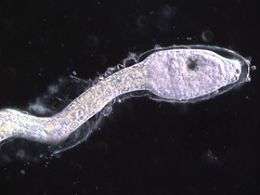The sophisticated sex lives of sea squirts

(PhysOrg.com) -- It may not be pretty, but the humble sea squirt could well be the envy of many: the marine organism never has to worry about contraceptives or IVF.
A UQ study, which is today published in prestigious US journal Proceedings of the National Academy of Sciences, has revealed that sea squirts have a natural ability to control their reproductive cycle, becoming more or less fertile as required.
Lead researcher and PhD student with UQ's School of Integrative Biology, Angela Crean, said the marine organisms could tailor their reproductive cells depending on the level of competition in the sea.
“When there are lots of competing males trying to fertilise the eggs of females, males produce larger, more competitive sperm that live for longer,” Ms Crean said.
“Similarly, when females detect that there are too many males competing for her eggs (too many sperm can kill the eggs of some organisms) the females ‘play hard to get' producing smaller eggs that are harder for searching sperm to find.
“These changes make sense if you're stuck to a rock like sea-squirts are.
“If you can't run away from a highly competitive environment, you must therefore make your gametes more competitive in order to get a higher chance of successfully reproducing.”
The fact that sea squirts don't move made it possible for the majority of the investigation to be conducted in the Moreton Bay field environment.
In a Big Brother-style approach, the primary experiment involved placing a large number of sea squirts in a confined space for an extended period.
“We manipulated adult densities in the field by placing either one (low density) or 15 (high density) sea squirts in a cage for one month,” Ms Crean said.
“This research tells us a little as to how sex evolved in the first place.
“Specifically, it gives us some insight into why sperm are so tiny and males make millions of them whereas female eggs are much larger and are produced in fewer numbers.
“Because these organisms reproduce by the ancestral mode of reproduction, it gives us an indication as to how competition between males led to all sorts of reproductive strategies including the one used by humans: internal fertilisation.”
This research forms part of Ms Crean's PhD, which she hopes to complete by the end of 2009.
Provided by University of Queensland














